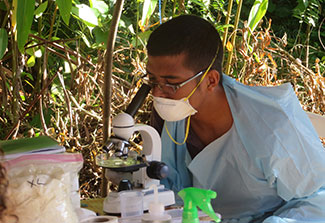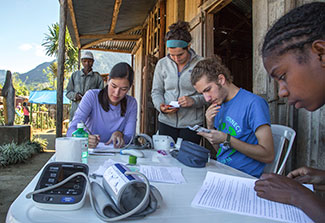Scientists in Madagascar study novel methods to predict disease spread with support from NIH-NSF Ecology and Evolution of Infectious Diseases Initiative (EEID)
September / October 2019 | Volume 18, Number 5

Photo courtesy of Dr. Charles Nunn/Duke University
A new Fogarty-funded project in Madagascar will support
researchers like Tamby Ranaivoson to develop and apply new
frameworks for predicting the spread of zoonotic diseases.
Scientists study novel methods to predict disease spread Zoonotic diseases - infectious diseases that spread from animals to humans - are a major health threat in Madagascar. To understand why some people become conduits for these diseases, and whether farming practices or socioeconomic factors might influence transmission, a team of Fogarty-funded researchers will apply new analytical approaches for predicting infection. The
grant to Duke University, totaling nearly $2.4 million over five years, recently was awarded through the
Ecology and Evolution of Infectious Diseases (EEID) program, a joint initiative between the NIH and the National Science Foundation (NSF).
“Most of the work in ecology, evolution and infectious disease has focused on the community composition and the abundance of different animal and human hosts. And we’re really trying to model how hosts are coming into contact with one another, or how they’re sharing habitats, and using that to generate a mathematical representation of disease transmission,” said Dr. Charles Nunn, an ecologist and professor at Duke University who is the principal investigator on the project.
Nunn has assembled an interdisciplinary team of scientists with expertise in ecology, mathematics, sociology, evolutionary medicine, anthropology and environmental economics. Investigators will work in four villages around Marojejy National Park in the northeastern part of the country. They will collect biological samples and location data from about 250 residents from each location, as well as from small animals such as rodents and bats, and domestic animals including dogs, cows and pigs. The villagers and their domestic animals will be equipped with GPS devices to track to their movements. People will also be surveyed about their household size, education and other demographics, their health, social network, agriculture and other economic activity, land-use decisions and conservation attitudes.

Photo courtesy of Dr. Charles Nunn/Duke University
A new award through the joint NIH-NSF Ecology and Evolution
of Infectious Diseases (EEID) initiative will support an
interdisciplinary team of scientists in Madagascar.
Using innovative mathematical frameworks, those pieces of information will be brought together to generate networks representing interactions between people and animals. The team will then assess whether the transmission models they generate actually predict patterns of infection.
Zoonotic diseases in Madagascar that will be studied include the plague - which is typically spread to humans through flea bites - and leptospirosis - which people can get when they come in contact with water contaminated by urine from an infected animal. While those diseases may not be common in other countries, the research could have broad implications. "Emerging diseases are still an issue. We see that with Ebola in the Democratic Republic of Congo and West Africa, or other outbreaks of infectious diseases, many of which come from wildlife or domesticated animals,” Nunn said. “We hope the general principles and methods we’re using in Madagascar will apply more generally to other locations in the world.”
While this is Nunn’s first Fogarty grant, he has years of experience working in Madagascar. The island country off the coast of East Africa provides an interesting environment for the research, according to Nunn. It is one of the world’s poorest countries, but it is rich in biodiversity, with many species that are unique to the island. The population is growing and people are now encroaching on forests. In addition, land use is changing as some communities shift from subsistence farming to growing vanilla as a cash crop.
This project, like others Nunn has led, has a training component with Duke students working alongside Malagasy trainees doing field work in remote areas. In addition to research skills, Nunn says he facilitates cultural exchange, with trainees eating at the same table and learning each other’s language and culture.
“Our work is at the nexus of human health, conservation, ecology and evolutionary biology. There’s so much potential for that kind of research, including in the United States,” Nunn said. “I really hope we’re going to provide some new frameworks for investigating these questions, improving health and also helping conserve biodiversity.”
More Information
To view Adobe PDF files,
download current, free accessible plug-ins from Adobe's website.